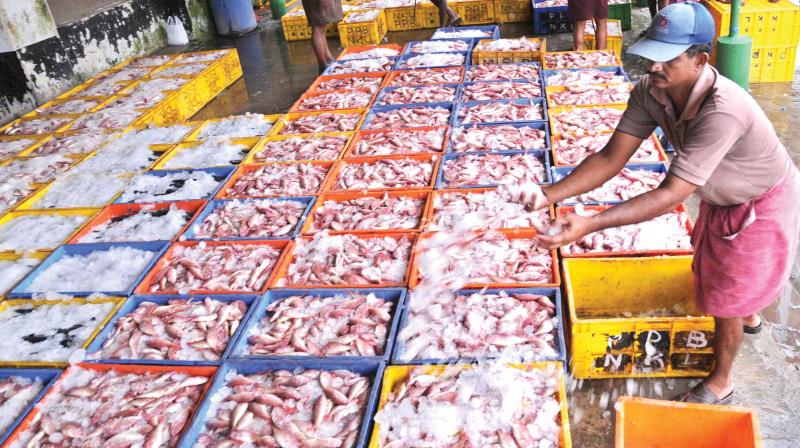Kerala: Fishing in polluted waters

Kollam: The marine products exporters in Kerala are in troubled waters with discouraging trends on the export front due to various reasons, including the central government's policies and the poor quality of the products exported.
The processed marine products export from the state has dipped by nearly 40 per cent making it one of the worst -performing in the country, say exporters. The exports suffer due to the wrongly-implemented export codes for finished products as well as the strict sanitation checks employed at ports which lead to rejection of export consignments, they say.
According to the statistics with the Marine Products Export Development Authority (MPEDA), the total value of exports from Kochi port during 2017-18 was Rs. 5805.11 crore, a slight improvement from the previous Rs. 4860.98 crore. However, as per unofficial records, the exports dipped by over 25 per cent in the last quarter in Kerala region.
"The official records published might not reflect the actual picture as this is a seasonal business. The published values are average while the reality is a stark decline in our business," an exporter told DC.
The consignments shipped to the European Union (EU) are rejected during sanitation checks as the inspection process was recently intensified to cover over 50 per cent of the consignment from an earlier 10 per cent. This is owing to India's recent policy of hundred per cent sanitation check employed for the products imported from the EU.
The EU has intensified the sanitation checks apparently as a tit for tat to the Indian government's attitude of denying relaxation for imports from the EU. The free trade agreement between the EU and India has not come through either. The balance of trade in this case is favourable, but has not yet evolved into a complete form.
This has adversely affected the marine products exports from the country with high rejection rates of products, including shrimp, which used to earn the highest foreign exchange earlier.
"We have no control over what we get from the sea. We export the products after certifying them in government laboratories and the approved labs. These are getting rejected in foreign shores due to diehard standards imposed, though sanitation checks are done batch-wise and code-wise by us," a top exporter told DC.
The government is not ready to take the responsibility for these consignments being rejected. In foreign countries, they have research teams to identify spots in the sea where the concentration of heavy metals, including lead, is on a high. This is not done by the authorities here as they blame exporters for the flaws in sanitation checks instead of tackling it at the source. In aquaculture, use of antibiotics has turned out to be a menace due to lack of proper monitoring.
In marine exports, the cephalochordates sent to EU should get the clearance on the presence of heavy metals in its meat. The exporters demand that the government agencies conduct inspections at the source of these marine products, including the harbours, taking responsibility for the quality of marine products. Instead, they confine inspections to the processing centres, the exporters say. "The brunt of rejection is faced by the exporters with zero support from the government," they say.
Sea pollution a reason?
Kerala is experiencing a dip in exports due to the policy change and the strict sanitation checks abroad. If a consignment is once rejected, the company is listed in the internal chart and it cannot continue the exports further.
Another reason cited is an obvious increase in the presence of heavy metals in the seas due to pollution, which cannot be prevented by the exporters. In foreign countries, the quality of water is checked at the source which is reflected on the marine products. Identifying pollution-free zones in the sea could improve the quality of products which help exporters avoid rejection of their consignments.
The major cause for this rejection is the 50 per cent sanitation check on the export products in the EU, which is due to the wrong approach of the Indian government, according to the exporters.
The marine products, including squid and octopus, are exported from India to countries like China, Thailand and Vietnam. These are then reprocessed and exported to the EU without any rejection. Here, we have issues in exports of finished products from the country only due to diplomatic issues of the government.
Policy change also to blame
Until 2015, the marine exports were based on the foreign trade policy 'Vishesh Krishi and Gram Udyog Yojana' (VKGUY) which was replaced by the Merchandise Exports Incentive Scheme (MEIS). During the pre- MEIS period, the exporters were given incentives as subsidies based on the chapter-wise criteria in the VKGUY. With the MEIS, the exports of marine items were made code-specific. This has unsubsidised a considerable number of marine products affecting the income generation of the exporters.
Ironically, after the introduction of MEIS, the exporters were even asked to repay the entire subsidy received by them for certain products like 'conch' under the VKGUY during pre-2015 period.
The exporters or the authorities are not yet clear on the ITC-HS codes or the Indian Trade Clarification based on Harmonized System of Coding adopted for import-export operations, the exporters say. With all these, the government, from its position of a facilitator, has become a dictator over foreign trade.

